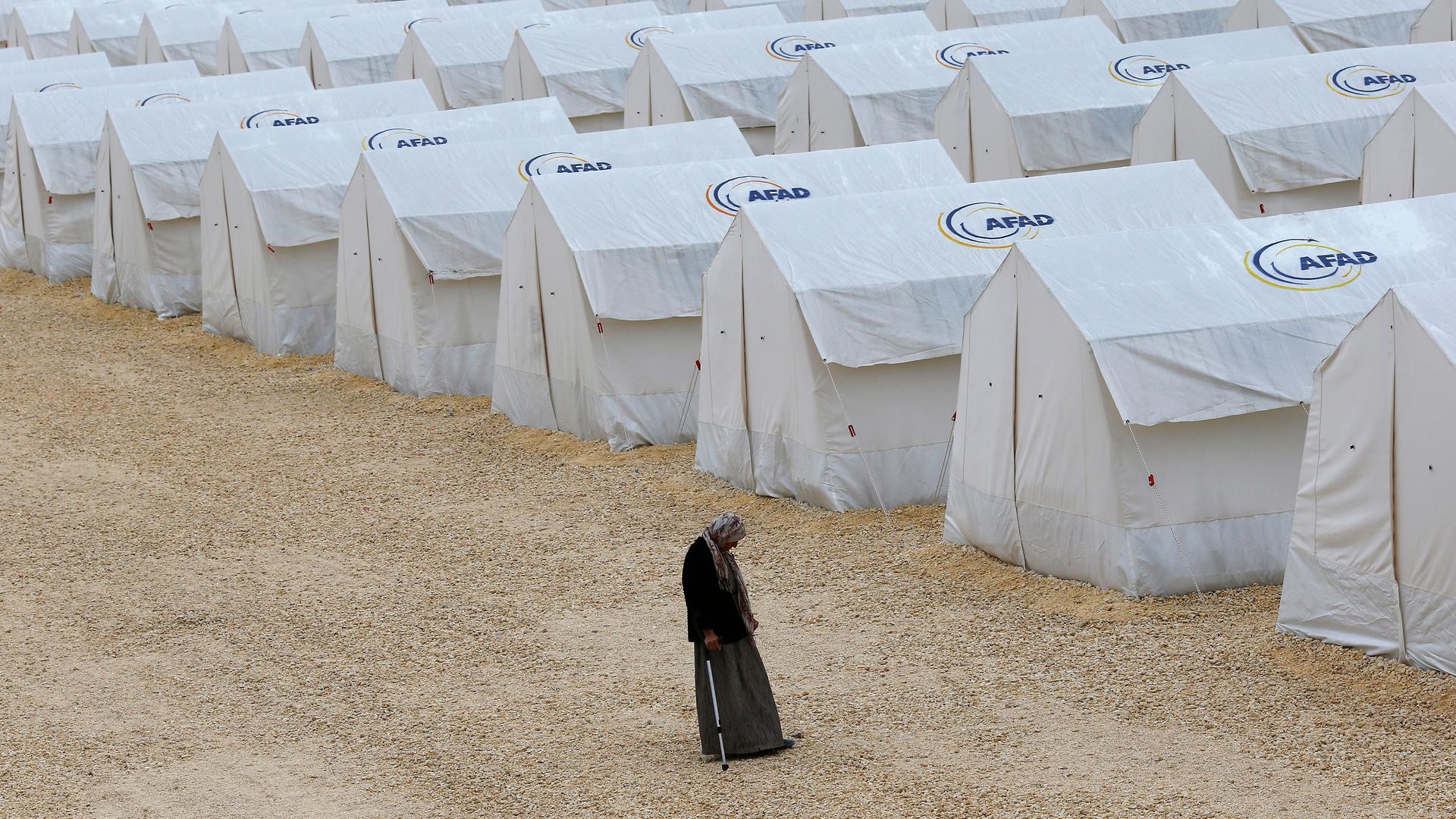A Kurdish refugee from the Syrian town of Kobani walks along tents at a refugee camp in the border town of Suruc, Sanliurfa province.
The City of Houston has accepted perhaps the largest number of Syrian refugees in the US since the Syrian civil war began. Still, the numbers in the past year have been quite small.
“We’ve resettled 14 to be specific. Two families of five and one family of four,” said Dario Lipovac, who oversees refugee resettlement for the YMCA of Greater Houston.
All told, five local agencies in Houston have resettled close to 100 Syrians over the past year.
"I'm more disappointed than surpised," said Lipovac. "It just reflects how few have arrived nationwide, and that's very unfortuante."
The number of Syrian refugees in Houston might not be getting bigger anytime soon — the governor of Texas, Greg Abbott, sent a letter to President Obama today saying his state won’t accept more Syrian refugees. With that, Texas joins a growing list of states saying they will not accept Syrian refugees. Legal experts reacted saying these actions are unenforceable.
The Obama Administration has called for resettling 10,000 Syrian refugees this year. The US is expected to take in between 1,600 and 1,800 Syrians during the most recent fiscal year.
In Turkey today, President Obama said his number one priority was to ensure the nation's security. But he made it clear the US will not stop accepting refugees.
“Slamming the door in their faces would be a betrayal of our values. Our nations can welcome refugees who are desperately seeking safety and ensure our own security. We can and must do both,” President Obama said.
More than 4 million Syrian refugees are now in Turkey, Jordan, Iraq and Lebanon. Only a fraction of those will get placed in a third country like the US. To qualify to come to the US, refugees, from any country, first need to be screened by agencies like the Department of Homeland Security and the United Nations.
I met a Syrian woman in Houston, Lina, who went through that screening. She arrived in Houston with her husband and four children last December. They’re from the Syrian city of Homs, a stronghold of opposition to the Syrian government. Her family fled to another Syrian city where they spent a year-and-a-half. Then they spent a year-and-a-half in Egypt. Eventually, they were relocated to Houston, a city she’d never heard of, where she knew no one.
This is the typical process: Syrians are displaced within their own country, then go to a neighboring country, then a third country. It's a long path for refugees from any nation to eventually get to the United States, and it’s been especially slow with Syrians, said Wafa Abdin, vice president of immigration and refugee services with Catholic Charities of the Archdiocese of Galveston-Houston.
“The whole political situation there <Syria>, because of the rise of Isis, most of the people who are coming are Muslim, so there is this idea we want to make sure, absolutely, they’re not terrorists, they’re not connected to them, they’re not going to come to hurt the homeland. So, as a result, very few are being approved,” said Abdin.
We spoke last week, prior to the Paris attacks, and I asked her if she thought the US government was processing people too slowly or doing the necessary due diligence to keep us safe?
“It’s really hard to answer this question,” said Abdin. “I understand that this would be a huge concern. But at same time, I personally think that these are people in dire need of help. All we see are families with young kids and people who really are in a bad situation.”
Today, Catholic Charities said it could not comment on the Texas governor’s call to close the door to Syrian refugees. But Jim Townsend, a spokesman with Catholic Charities in Houston said, via e-mail, “I think it's important to emphasize that not all Syrians are dangerous, and not all Westerners are afraid of them. The tragedy in Paris is horrific. It's just the sort of thing from which decent human beings have been fleeing.”
Last week, I also spoke with Jeff Watkins with the YMCA in Houston. He said national security interests are very important, but need to be balanced with humanitarian interests. And he pointed out that trying to get to the US through an official refugee resettlement program is not an efficient route for a would-be terrorist.
“It would be like the lottery, literally, because 4 million Syrians to date have been forced to flee and have been identified as refugees. This year, if everything goes perfectly, a maximum of 10,000 would come to the US. Those aren’t good odds if your intent is to come to this country and cause harm,” said Watkins.
I contacted the YMCA again today, but Watkins couldn’t comment on the governor’s announcement.
I asked the Syrian refugee I met, Lina, how she feels about many Americans being afraid of Muslims from her country.
She said she spoke with me because she wants to clear the image of Muslims. She said Muslims live in peace and are not terrorists. She also said she wants to return to Syria when it’s safe.
Our coverage reaches millions each week, but only a small fraction of listeners contribute to sustain our program. We still need 224 more people to donate $100 or $10/monthly to unlock our $67,000 match. Will you help us get there today?
